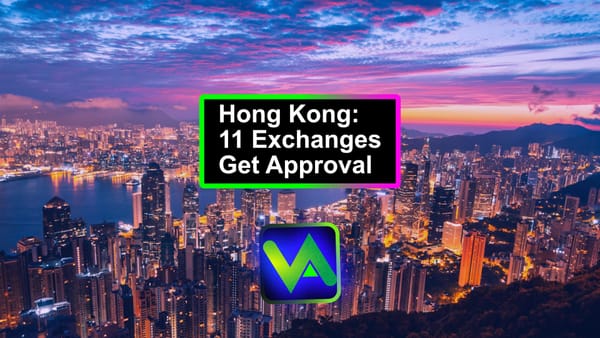
Hong Kong Advances Virtual Assets Regulation with 11 Exchange Approvals
Hong Kong has been making significant strides in establishing itself as a global hub for virtual assets and Web3 technologies. However, the city's regulatory landscape has been a topic of much discussion, particularly in light of recent developments surrounding the licensing of cryptocurrency exchanges. Over the past week, several key events have unfolded, shedding light on the challenges and opportunities that lie ahead for Hong Kong's virtual asset ecosystem.
Strict Licensing Requirements Raise Concerns
On June 1, 2024, Hong Kong's new licensing regime for virtual asset trading platforms (VATPs) came into effect. Under these regulations, all VATPs operating in or marketing to Hong Kong investors must be licensed by the Securities and Futures Commission (SFC) or qualify as "deemed-to-be-licensed" applicants. Failure to comply with these requirements is considered a criminal offense.
However, the stringent nature of these licensing requirements has raised concerns among industry stakeholders. Duncan Chiu, a member of Hong Kong's Legislative Council, criticized the "excessively stringent" rules, arguing that they have deterred major global exchanges from entering the Hong Kong market and have dampened investor confidence.
In the weeks leading up to the June 1 deadline, several prominent exchanges, including Huobi, OKX, and Bybit, withdrew their license applications. Some exchanges cited the need for significant overhauls of their trading platforms to meet Hong Kong's regulatory standards.
Initial Approvals and Deeming Arrangements
Despite the challenges posed by the strict licensing requirements, the SFC has granted initial approval to 11 cryptocurrency exchanges to continue their operations in the city under a "deeming arrangement". This marks the first step towards issuing the first VATP licenses since 2022.
Among the approved exchanges is Crypto.com, which was founded in Hong Kong and now operates from Singapore, making it the largest exchange in the city under the deeming arrangement. Currently, Hong Kong has only two exchanges authorized to serve retail customers, with HashKey being the most recent addition to the list in 2022 under the previous voluntary scheme.
The new regulations, enacted last year, require the deeming arrangement for exchanges to operate in the city while they await full approval of their licenses beyond June 1, 2023. At present, Crypto.com is the sole exchange in the top 20 by 24-hour trading volume, as per CoinGecko, that is still seeking a license in Hong Kong.
Navigating Regulatory Challenges
The mass retreat of crypto exchanges from Hong Kong has been attributed to various factors, including the SFC's requirement that licensees commit to barring mainland Chinese users in any region. This condition has proven challenging for many offshore exchanges to meet.
Additionally, the high compliance costs and extensive overhauls required for obtaining a license have led more than a quarter of the initial 24 applicants to abandon their applications and cease operations in Hong Kong.
The withdrawals have raised concerns about the progress of Hong Kong's efforts to attract crypto businesses to the city, an initiative that was initiated at the end of 2022. In a recent opinion piece published in the Hong Kong Economic Journal, Legislative Council member Duncan Chiu, who represents the information technology sector, wrote that the withdrawals had shaken market confidence in local Web3 development
Optimism Amidst Uncertainty
While the regulatory landscape presents obstacles, there are still reasons for optimism regarding Hong Kong's crypto industry. The city has become a hotbed for crypto-backed securities, hosting a string of Bitcoin and Ethereum Exchange-Traded Funds (ETFs).
Furthermore, Hong Kong's virtual banks are exploring opportunities in the digital asset space. ZA Bank, the city's largest virtual lender, is preparing to introduce virtual asset trading services for retail investors.
The Hong Kong government remains committed to fostering innovation in the virtual asset sector. Christopher Hui, Hong Kong's Secretary for Financial Services and the Treasury, recently promoted the city's Web3 ecosystem during a visit to the Netherlands. Hui emphasized Hong Kong's initiatives in tokenization and stablecoins, highlighting the potential for global collaboration.
Balancing Innovation and Investor Protection
As Hong Kong navigates the complexities of regulating virtual assets, striking a balance between innovation and investor protection remains a key priority. Julia Leung, chief executive of the SFC, acknowledged the resilience of Bitcoin as an alternative asset class while emphasizing the need for robust safeguards to mitigate risks.
The SFC is actively working on establishing regulations for stablecoins and collaborating with the Hong Kong Monetary Authority on Project Ensemble, a tokenization initiative exploring the potential of a central bank digital currency.
Conclusion
Hong Kong's virtual asset regulations have undergone significant developments in recent weeks, with the implementation of a new licensing regime, the withdrawal of several major exchanges, and the initial approval of 11 exchanges under a deeming arrangement. While the stringent requirements have raised concerns, the city remains committed to fostering a thriving Web3 ecosystem while prioritizing investor protection.
As Hong Kong continues to refine its regulatory approach, striking a balance between innovation and risk mitigation will be crucial. The coming months will be pivotal in shaping the future of Hong Kong's virtual asset landscape, as the industry navigates the challenges and opportunities that lie ahead.